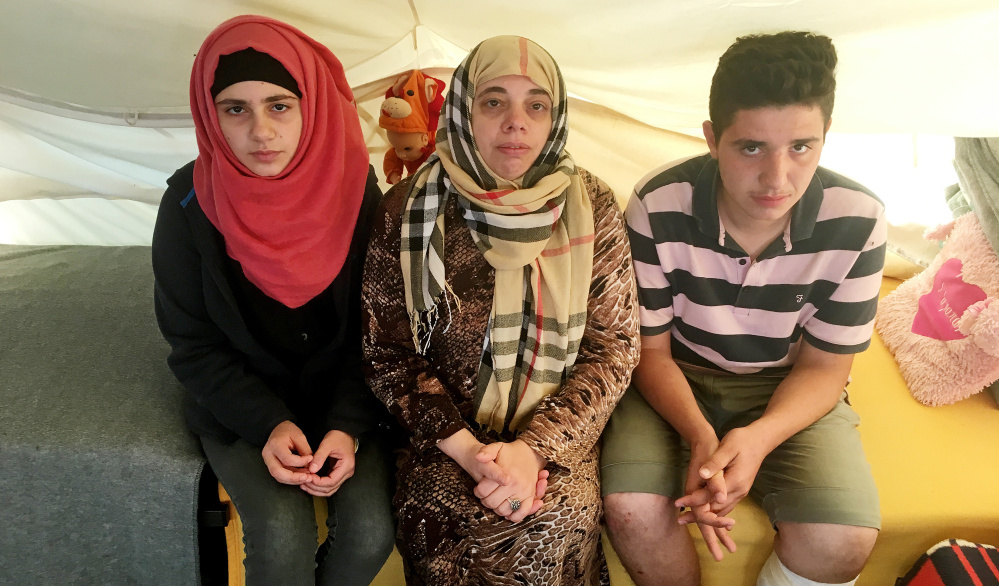DIAVATA REFUGEE CAMP, Greece — When Europe abruptly closed its land borders 16 months ago to refugees fleeing war, it made a much-heralded promise: Wealthy nations across the European Union would take in tens of thousands of desperate Syrians and Iraqis who had made it as far as near-bankrupt Greece only to find themselves trapped.
But one by one, those nations have reneged, turning primitive camps like this one into dire symbols of Europe’s broken pledge.
Amid allegations of mismanagement by the Greek government, this site on the grounds of an abandoned toilet-paper factory still lacks basic heat even as nighttime temperatures dip into the low 50s. Mosquitoes infest the white canvas tents of refugee families stranded here for months. A 14-year old Syrian girl was recently raped. There are allegations of stabbings, thefts, suicide attempts and drug dealing.
“I won’t go out alone anymore,” said Rama Wahed, a 16-year-old Syrian girl hugging herself in her family’s tent.
In the opposite corner, her 17-year old brother, Kamal, stared blankly ahead. Since their father died in Syria, he is the “man of the family.” But he looks like a lost little boy. Like so many others here, their family of five has been waiting for word to go somewhere, anywhere but here. Caught in a broken system, they are losing hope.
Kamal swatted at the mosquitoes swarming his legs, both of them bandaged and infected after he couldn’t stop scratching at the bites. To keep the bugs at bay, they run a cheap fan inside the tent, even though it only makes cold nights feel colder
“We’re never getting out of here,” he said. “Never.”
On June 26, 2015, the EU agreed it would relocate 40,000 refugees – mostly Syrians – to member countries from Portugal to Finland. They would be given shelter, aid and a chance to rebuild their lives. As the number of asylum seekers surged, the EU later boosted its pledge – promising to relocate up to 160,000.
But 16 months after its initial decision, the EU has lived up to only 3.3 percent of that pledge, relocating 5,290 refugees – 4,134 from Greece and 1,156 from Italy.
Some of the pledged nations cite concerns about cultural differences and militants masquerading as migrants. Those countries that are offering spaces are offering fewer than they originally pledged. Others are offering none at all. Last week, Austria’s foreign minister became the latest senior European official to suggest the bloc should simply drop the pretense and scrap what he called a “completely unrealistic” program.
In Greece, the U.N. High Commissioner for Refugees is laboring to get as many refugees as possible into hotels and apartments, but most are still facing harsh conditions in unheated camps.
An hour after dawn on a recent weekday, Abdelwahab 14, the youngest son in the Wahed family, walked to school with his 10-year-old sister, Joudy.
“We used to walk to school together in Aleppo,” he said. “It’s different now. Everything is.”
For starters, school isn’t real school. The Greeks this week are rolling out a pilot program, allowing up to 1,500 refugee children into public schools. But some Greek parents – including those who send their children to a school not far from this camp – have staged protests to stop them. They argue the refugee children may carry contagious diseases and live in such unhygienic conditions that they pose a health risk.
In this former toilet-paper plant where the Waheds are forced to live, the best education on offer is a few hours a day in an impromptu schoolhouse run by Save the Children. Some of the children here, according to Ahmed – their teacher and a Syrian refugee himself – have been out of school for four years.
“They need to be settled,” he said. “They are missing out on their futures. They need a real home.”
Rama Wahed’s mother, Lamis, a 48-year-old widow struggling to care for four children, was at the family tent, doing what she does best: trying to cheer them up.
When they crossed the Aegean Sea last March in a packed raft, her children came ashore in Greece wet and afraid. She cracked a joke about wet cats. All the kids, she said, laughed.
But humor is not working now.
“We are stuck here,” Rama said. “Nobody cares what happens to us.”
Send questions/comments to the editors.



Success. Please wait for the page to reload. If the page does not reload within 5 seconds, please refresh the page.
Enter your email and password to access comments.
Hi, to comment on stories you must . This profile is in addition to your subscription and website login.
Already have a commenting profile? .
Invalid username/password.
Please check your email to confirm and complete your registration.
Only subscribers are eligible to post comments. Please subscribe or login first for digital access. Here’s why.
Use the form below to reset your password. When you've submitted your account email, we will send an email with a reset code.